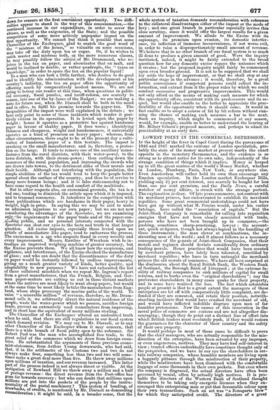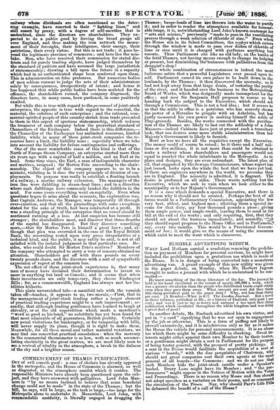LOWEST POINT IN THE COMMERCIAL DEPRESSION. IF the height of
the fever in Capel Court during the paroxysms of 1846 and 1847 marked the extreme of London speculation, pro- bably the state of the money market at present marks the exact opposite in the monetary thermometer, and the evidence is so strong as to attract notice for its own sake, independently of the strange condition of things which it implies. Money is heaped up in all the great centres of the world's Money Market,'whether in London, Hamburg, Paris, New York, or anywhere else. Even Amsterdam will rather hold its own than encourage any Russian speculation. In the London market Exchequer Bills, yielding only 2I per cent interest, can scarcely be bought for less than one per cent premium, and the Daily News, a careful watcher of money affairs, is struck with the strange portent. The explanation is clear. Of late years commerce, not content with its merchant princes, has endeavoured to establish its merchant republics. Some great commercial undertakings could not have been got up without what M. Pereire would, under his earlier tutelage, have called the "association of capitals." But the Joint-Stock Company is remarkable for calling into requisition energies that have not been closely associated with trade, persons who have not been brought up in commerce,—the pushing, sometimes sharp-practising, lawyer ; the account- ant, quick at figures, though not always logical in the handling of instruments; struments in-
sinuating the man clever at combinations, the man of the world ; and it almost follows as a necessary
consequence of the genesis of Joint-Stock Companies, that their morale and regimen should deviate considerably from ordinary trading morals. Hence practices that would have been seen by merchant princes, have lately been tolerated, sanctified by merchant republics ; who have in turn untaught the merchant princes the old morals of commerce. We have all been surprised at the disclosures about the Royal British Bank, the Western Bank of Scotland, the Borough Bank of Liverpool ; at the extreme fa- cility of railway companies to sink millions of capital for small returns, and to burke even the "original shareholders"; nay the preference shareholders in many cases quake for their property, and in some have realized the loss. The fact which astonishes people at present is that to a great extent the managers of these enterprises are let off with comparatively little complaint, are de- fended if they are censured, and retain their position, notwith- standing incidents that would have crushed the merchant of old, and would have inflicted indelible disgrace upon men of far humbler pretensions. Now the causes of this innovation in the moral police of commerce are curious and are not altogether dis- couraging; though they do point out a distinct line of effort into which British traders must resolutely, push, if they would restore the guarantees for the character of their country and the safety of their own property. It would perhaps in most of those cases be difficult to prove that the chief managers, who are actually responsible for the mis- direction of the enterprise, have been actuated by any improper, , or even ungenerous, motives. They may have had self-interest in view ; trusted officers undoubtedly have sometimes thought only of the perquisites, and we have in our eye the shareholders in cer- tain railway companies whose humbler members are living upon a beggarly pittance through the misdirection of their property, while the misdirectors have been dismissed with the comfortable luggage of some thousands in their own pockets. But even where the company is disgraced, the actual directors have often been governed by venial, often by actually high motives. It is pro- bable the directors of the Western Bank of Scotland thought themselves to be taking only energetic licences when they en- couraged this enterprising man or put that favourable colour upon their own transactions. Such an act was "a Bonaparte blow" for which they anticipated credit. The directors of a great
railway whose dividends are often mentioned as the deter- ring example, have resorted to their "fighting lines," and still resort by proxy, with a degree of self-sacrifice that is undoubted, since the directors are shareholders. They ex- pected to do a publie good by forcing the broad gauge all over England, and thus making the iron network the monu- ment of their foresight., their intelligence, their energy, their patriotism, their every virtue. But this is not trade ; it goes be- yond the legitimate province of commerce ; and here lies the mis- take. Men, who have received their commission for stated dis- tricts and for purely trading objects, have judged themselves by the standard of patriots and have assumed the large jurisdiction of statesmanship ; drawing a bill upon the future in a capacity which had in no authenticated shape been conferred upon them. This is administration on false pretences. But numerous bodies
of men seldom consent to their the acts of the administrators solely by consequences, irrespectively of intent ; and hence it has happened that while public bodies have been mulcted for the offences, the shareholders ruined, the company disgraced, the directors have, in many cases, been pardoned, in some positively exalted.
But while this is true with regard to thepersonnel of joint-stock enterprises the opposite is true with regard to the essential, the material, the sad.ns of such enterprises ; and the rational, com- mercial-spirited people of this country shrink from trade presented to them in this aspect of spurious statesmanship, which reduces the treasurer of each company below tbe proverbial standard of Chancellors of the Exchequer. Indeed there is this difference — the Chancellor of the Exchequer has unlimited resources, limited liability, while in many of these joint-stock companies the re- sources have a limit, the liability none ; especially when we take into account the liability for future contingencies and sufferings. One of the most remarkable cases of this kind is that of the North of Europe Steam Company, an enterprise started more than six years ago with a capital of half a million, and an Earl at its head. Some time since, the Earl, a man of indisputable character and motives resigned ; Sir Morton Peto succeeding to the chair- manship. The object of this company appears to us to be a mistake, violating as it does the very principle of division of em- ployments. Its purpose was really to establish a floating branch of a railway, a marine railway extension. The managers of the iron line were dabbling in steam-boat lines and in a direction where such dabblings have commonly landed dabblers in the mud. For some years everything went on capitally. Even when questions began to arise about the accounts the explanation was,
at Captain Andrews, the Manager, was temporarily ill through over-exertion, and that all the proceedings with some exceptions stated for the sake of truth, had been conducted at a profit. It was a standing principle of the enterprise that no vessel should be oontinued running at a loss. At last suspicion has become still stronger ; the shareholders meet, and discover that three-fourths of the capital has disappeared. But they discover something more,—that Sir Morton Peto is himself a great loss/.; and, al- though that plea was overruled in the ease of the Royal British Bank, the overruling rested upon very gross irregularities of a technical kind, and the public, it may safely be said, is not at all satisfied with the isolated judgment in that particular case. Be- sides, who could doubt Sir Morton Peto's motives ? Members of the company who attempted to carry a vote of censure obtained no attention. Shareholders get off with three pounds on every twenty pounds share, and the directors with a sort of sympathetic expression of regret at the common loss. The net effect of these joint-stack experiences is, that many men of money have declared their determination to invest no more in anything but land or Consols ; and it seems that when their investments are only temporary, they choose Exchequer Bills ; for, as a commonwealth, England has always met her lia- bilities hitherto.
This plain unvarnished tale—a manifold tale with the varnish taken off—teaches, it appears to us, two morals,—First, that in the management of joint-stock trading rather a larger element of practical trading experience might be a safe improvement ; se- condly, that although trading gentlemen have learned to laugh at chivalry, or at the old superstition which made a merchant's "word as good as his bond, no substitute has yet been found for that most admirable of all guarantees, British probity. Certainly new penal visitations for bankruptcy, or for tampering with bills, will never supply its place though it is right to make them. Meanwhile, for all these moral and rather material vexations, we may find one somewhat practical consolation : when the mercury in the commercial thermometer is so low, with so much accumu- lating electricity in the great centres, we are most likely soon to Nee a revival of vitality in the atmosphere, a break in the dulness of the sky and a brighter season.



























 Previous page
Previous page